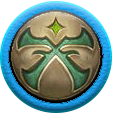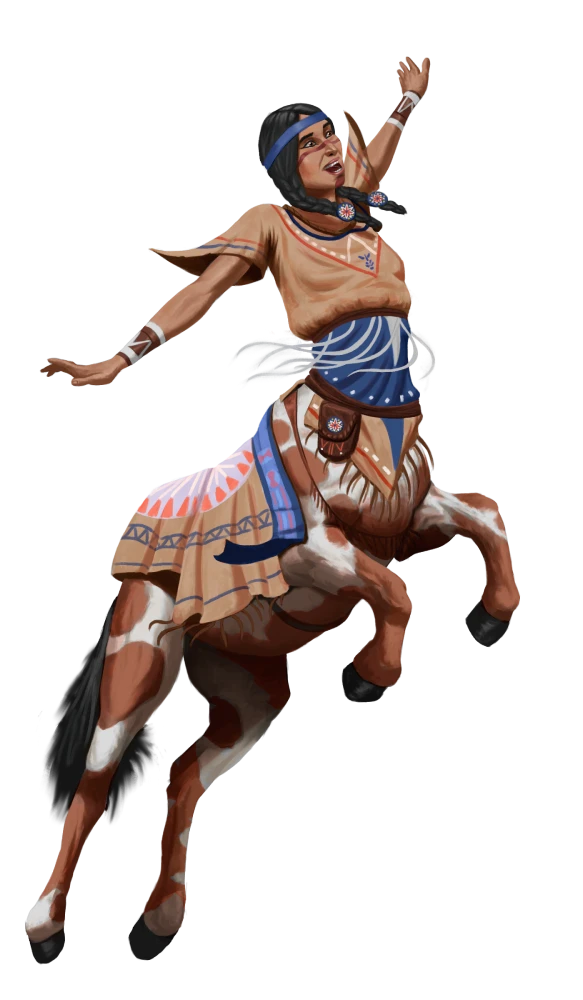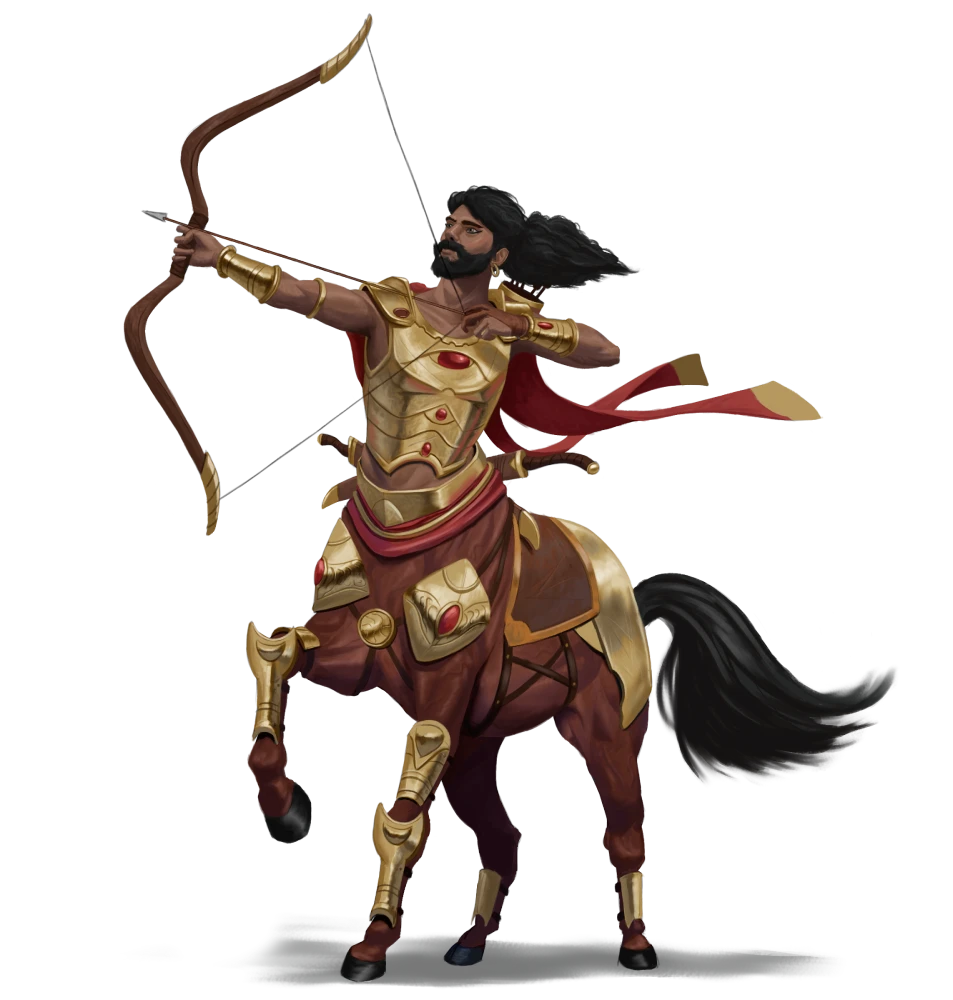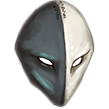
Centaur
 Uncommon Beast Centaur Humanoid Source Howl of the Wild pg. 29 2.1Centaurs are half-human, half-horse nomads who range wild and free across their ancestral lands. They're survivalists with a long history of teaching and instruction who stand firm in the face of danger using their skill at archery, herbalism, and magic.
Uncommon Beast Centaur Humanoid Source Howl of the Wild pg. 29 2.1Centaurs are half-human, half-horse nomads who range wild and free across their ancestral lands. They're survivalists with a long history of teaching and instruction who stand firm in the face of danger using their skill at archery, herbalism, and magic.Centaurs are proud nomads who range far and wide across their ancestral territories, protecting their lands from exploitation and intrusion. They are survivalists who forge tight bonds with family and community and stand firm in the face of danger. Many are skilled hunters, trackers, and warriors who do battle with bow, steel, and hooves. Brave and stubborn, they're willing to challenge even the fiercest foes and largest forces to protect their homes, kin, and the land within their domain.
As hunter-gatherers, centaurs rely upon the bounty of the natural world for sustenance. As youths, they're taught to nurture and respect their surrounding ecosystems so the land remains healthy and bountiful throughout their lives and is preserved for future generations. Centaurs understand that a land exploited or despoiled is a land unfit for survival, just as a herd overhunted dies off. In the ancient past, such carelessness and greed resulted in malnutrition, famine, and loss of territory, and most centaurs are careful not to repeat the mistakes of their distant forbears. Thus, centaurs prefer to adapt to their surroundings, rather than abuse their environments for their own comfort. They're guardians of nature, and their beliefs lead them to clash with careless urbanites and expansionists over exploitative and dangerous practices, including overhunting, overlogging, pollution, and city development.
Centaurs are happiest when mobile, and many feel restless or fall ill if cooped up or sedentary for too long. They're fond of racing and athletics, and are aggressively competitive, always striving to best their previous achievements and to outdo their fellows. This often results in centaurs being judged as contentious and boorish by outsiders. Most centaurs enjoy physical contests, particularly team sports, and award small but valued tokens to victors—though for many centaurs, bragging rights are the greatest prize of all. Not all centaurs compete as athletes, but most centaurs enjoy exertion and take naturally to activities that get their blood pumping and their heart racing.
If you want to play a character who runs free and proud, always looking out for their companions, you should play a centaur.
You Might...
- Go to great lengths to protect your home and the people you love.
- Enjoy competition, particularly organized sports and tests of strength or endurance.
- Respect and value the natural world.
Others Probably...
- Assume you're an expert archer or fierce warrior.
- Think you understand horses.
- Consider you aggressive and overly competitive.
Physical Description
Centaurs have the form of muscular humans with the bodies of horses from the waist down. They're hardy and stable, capable of carrying heavy burdens and cumbersome loads for long periods. Centaurs display great variation in their size, hair, and coloration, with most averaging 7 feet tall and weighing over 2,000 pounds. While coloration is often inherited, a centaur's coat markings are unpredictable, and many take pride in the distinct patterns, placements, and chromatic shifts of their coats. These markings are present at birth and don't change over the course of a centaur's life. In ages past, a centaur's markings were used to divine their future. Though this tradition has fallen out of favor since the death of prophecy, some particularly rare markings are still considered lucky or an ill omen today.
Society
Centaurs are originally from the continent of Casmaron, and most still reside there today, particularly in Iblydos and Iobaria. In Iblydos, many centaurs are agrarian, carefully and sustainably tending farmland and gardens, particularly for wildflowers, olives, figs, and grapes, from which they vinify a beloved (and potent) local wine. Thanks to popular folktales regarding the near-mythical centaurs Elthavus and Ventriadi, famed mentors to numerous ancient Iblydan hero-gods of old, it is traditionally believed that centaurs excel at training heroes. Centaurs have done nothing to dissuade this notion. Most centaurs enjoy the act of mentorship, and aging military leaders, healers, astronomers, engineers, and other experts are often thrilled to pass their knowledge down to younger generations. Thanks to their competitive nature, some centaur teachers compete with one another over who can train the most promising students, soldiers, and intellectuals.
Over the ages, centaurs spread throughout much of the Inner Sea via Iobaria, most notably the Isle of Kortos, where grudges against the citizens of Absalom are long-enduring. There, centaurs wage guerrilla warfare against the constant intruders into their territory and clash with nearby harpies and minotaurs. They range across the lowlands and forests, in alpine meadows, and throughout the Immenwood.
Centaurs maintain large territories that they range through in a nomadic lifestyle, living as mobile communities of hunter-gatherers. These areas are well defined and have been maintained through generations. At the heart of each territory is a centralized location of import. Often a religious site, meeting place, or camp is maintained for sick and the elderly centaurs who can no longer travel with the rest of their band. Occasionally, this camp is a permanent settlement, constructed of wood, limestone, clay bricks, or marble, depending on the region and environment, and surrounded by fields of carefully tended crops or flocks of chickens, goats, or sheep. Centaurs have a passing fondness for animals, but rarely keep domesticated pets and find horses off-putting.
A centaur band is a tight-knit community, led by a respected member of the group who's proven capable, wise, and calm under pressure. Usually, these leaders are middle-aged and older, as centaurs consider life experience a necessary quality in a leader. Rarely, a centaur or band chooses to become sedentary or integrate with a larger nation. These are often small bands whose territories have been destroyed or stolen, emissaries representing their bands, adventurers, loners, outcasts, or even bands who simply can't survive against a superior military enemy. Regardless, this choice is not made lightly, as most centaurs feel constrained in urban environments, particularly in settlements built for people smaller than them.
When built, centaur constructions are large and airy to allow for range of movement. Their buildings are communal, always aboveground, and open to the elements in places—wide doors held open, or roof and wall hatches to allow in light. Most are built of wood, thatch, and mudbrick while in Iblydos, harder materials like marble and stone are more likely. In Iobaria, they often repurpose old cyclopean ruins, which offer plentiful space. In Iobaria, herbalism, medicine, and magical purification are more commonly valued skills, thanks to the incessant plagues and illnesses that are prevalent in the region. A centaur band dare not travel without a few skilled healers, and even hunting parties and scouts rarely split off for long. Centaur healers and herbalists frequently put aside their differences and affiliations to exchange knowledge at annual meetings known as Soothings. There, band representatives from across the nation exchange medical breakthroughs and other knowledge. The largest of these Soothings occurs biannually in Vurnirn, the largest centaur settlement in Iobaria.
In Kaer Maga, Cheliax, Molthune, and Oprak, centaurs have assimilated with the larger nations, sometimes living as citizens and merchants, but more often serving as soldiers and mercenaries. In Garund, centaurs range across plains and savannas. They get along well with other nature-conscious cultures, teaming up with catfolk, tripkees, elves, and orcs to battle demons near Lake Ocota, undead near the borders of Geb and Mzali, and other dangerous threats. Centaurs remain open foes with Taldor and Andoran, remembering well the old wars with the expansionist Taldan empire that drove them into the Verduran Forest. Many in these regions dream of retaking their ancestral territories back from Taldan and Andoran control—a dangerous pipe dream certain to result in the deaths of countless centaurs.
Centaurs believe in reform and often rely on community pressure to discourage harmful behaviors. The unrepentant and the greatest transgressors face exile beyond the band's borders; centaurs avoid ending the lives of their own, except during times of war and mid-battle. While some centaur bands, serving demons and other foul gods, may attack other centaurs, even they prefer to harry other foes.
Centaurs consider saddles and bridles both restricting and shamefully insulting, akin to being shackled and caged. They despise being ridden and refuse to serve as a mount except in the direst of circumstances or emergencies, or only by their most trusted companions.
Beliefs
The beliefs of a centaur often depend on where and how they were raised. Many centaurs follow the
Green Faith or worship deities who share their respect for nature, such as
Cernunnos,
Erastil, or
Gozreh. Others feel kinship with
Desna, goddess of travel. Healers and herbalists favor
Immonhiel or
Pharasma. In urban areas,
Kurgess and
Gorum are favorites, depending on the centaur's temperament and profession.
Centaurs have two primary religious figures: Greenspeakers and Faithspeakers. Greenspeakers are one with nature, followers of the Green Faith, exceptional herbalists, and otherwise learned in the ways of the natural world. Faithspeakers are pious devotees of gods, demons, celestials, and other beings. Both are given equal respect, considered two sides of the same coin. Through their Speakers, centaurs interact with the world beyond what they can see and feel, and lead ceremonies, celebrations, and prayers. Celebrations are usually divided into two categories: beginnings and endings, with beginnings such as weddings, births, and spring celebrated at dawn, and endings such as harvests, funerals, and partings celebrated at dusk. Death rites vary by region and culture, but sedentary bands and those who cultivate fields, gardens, or crops, often burn their dead on pyres, releasing their spirits from their material bodies, then using the resulting ashes to fertilize fields or gardens so the dead can continue to serve their community. In regions with rocky ground or frigid climate, centaurs instead bury their dead under cairns and stone mounds.
Popular Edicts ensure knowledge is passed on, live in harmony with the natural world, play fair in an honest competition
Popular Anathema fail to roam, aid in the wanton destruction of a natural landscape
Adventurers
Centaurs enjoy traveling and excitement, and are drawn to a life of adventure, though few enjoy leaving their band. Centaurs commonly adventure to protect their lands and people from outsiders or great evils, to explore new territories, or to act as ambassadors. Many have the
field medic,
herbalist,
hunter,
nomad,
scout, or soldier background. Centaurs who favor combat most often become
fighters or
rangers, while Faithspeakers and Greenspeakers are more likely to be
clerics,
druids,
oracles, or
witches. While some centaur healers are
alchemists, it's more likely a centaur adopts the
herbalist or
medic archetype.
Names
Centaurs have a single name and sometimes earn an appellation through their deeds, appearance, or personality traits, such as Thunderhoof or Windrunner. When beyond their territorial borders, centaurs use their band's name as an additional identifier. Centaurs who settle in other nations either adopt their band name as a last name or create a unique last name of their own, founding a lineage that's passed down to future generations.
Sample Names
Aecora, Demeleon, Ertris, Hycanthe, Irdan, Jalvayne, Karala, Malion, Oridius, Tolron, Vorag
Centaur Mechanics
Hit Points
8
Size
Large
Speed
30 feet
Attribute Boosts
Strength
Wisdom
Free
Attribute Flaw
Charisma
Languages
CommonFeyAdditional languages equal to your Intelligence modifier (if positive). Choose from
Arboreal,
Cyclops,
Dwarven,
Elven,
Gnomish,
Halfling,
Jotun and any other languages to which you have access (such as the languages prevalent in your region).
You can see in
darkness and
dim light just as well as you can see in
bright light, though your vision in darkness is in black and white.
Mount
Your equine body is well suited for carrying trusted allies. A PC can ride you if they are one size category smaller than you (Medium size, for most centaurs), rather than needing to be two size categories smaller.
Robust
You increase your maximum and encumbered Bulk limits by 2.
 Licenses
Sources
Licenses
Sources
 Contact Us
Contributors
Support the Archives
Maximize Menu
Contact Us
Contributors
Support the Archives
Maximize Menu
 Licenses
Sources
Licenses
Sources
 Contact Us
Contributors
Support the Archives
Contact Us
Contributors
Support the Archives











